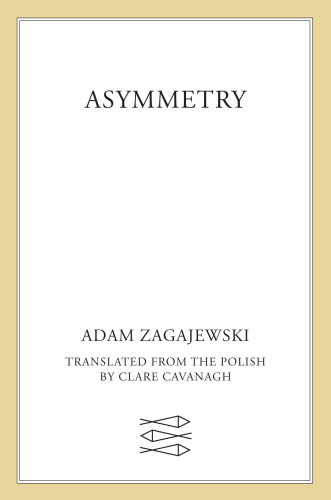
Asymmetry
Poems
کتاب های مرتبط
- اطلاعات
- نقد و بررسی
- دیدگاه کاربران
نقد و بررسی

October 1, 2018
In his new collection of poems, Polish poet Zagajewski, winner of the Griffin Poetry Prize Lifetime Recognition Award, explores the tension between freedom and captivity in time and space, as well as in relationships. His mother appears frequently, a specter he experiences more palpably in her absence than her presence, and his desire to make language physical recurs throughout the poems: he captures "only scraps of salty words" and witnesses silences that lasts until poets' "throats burst." There are Wordsworthian longings here, yet the poet retains a clear grasp on the real difficulties of childhood ("Now I'm sure that I'd know/ how to be a child"). As a self-proclaimed "tourist in the visible world," Zagajewski guides his readers through everyday fears, yearnings, and repulsions so that ultimately the asymmetries of the title are the things, that until we have to look them straight on, we stop ourselves from seeing. VERDICT For all poetry readers.--Emily Bowles, Univ. of Wisconsin, Madison
Copyright 2018 Library Journal, LLC Used with permission.

October 15, 2018
If the title of Zagajewski's book of prose, Slight Exaggeration (2017), served as a definition of poetry for a writer reluctant to define his aesthetic, his first collection of poems in five years confirms it. His aims here are modest, but to them he is faithful. Suitcase concludes, I'm just an absent-minded tourist / but I love the light. The imagistic Orange Notebook offers this observation, Tourists are souls doing penance. Not passing judgment on his own inclinations but, rather, admitting that his spaciness allows or obligates him to see and experience so much love for something that he forgets, briefly, how it inevitably passes from sight. There are elegies, including four about his mother remarkable for their even-handedness. These poems are poised but not to the point of stillness. In Senior Dance, the collection's title appears twice in one line that begins a stanza of abstract, almost irreconcilable contrasts, all describing his mother. In the final elegy, the unattainable and splendid seem possible only at the irreconcilable distance of life from death, of the transient from the eternal.(Reprinted with permission of Booklist, copyright 2018, American Library Association.)

























دیدگاه کاربران